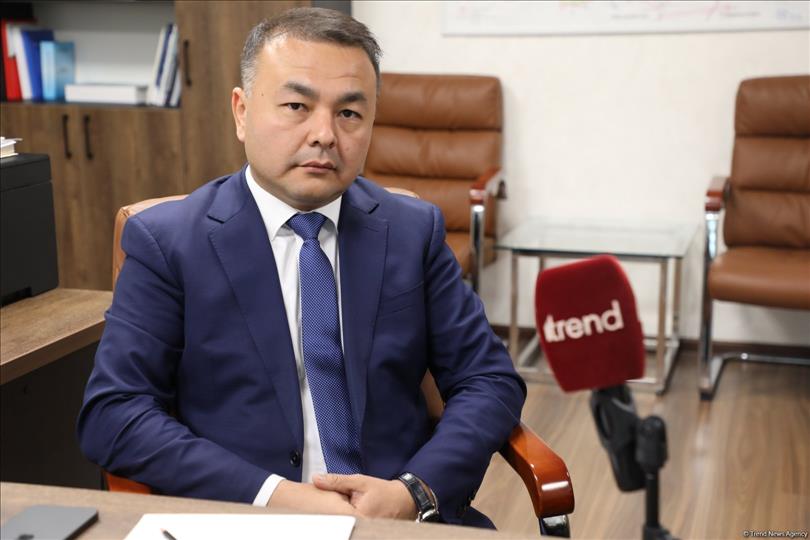
( MENAFN - Trend News Agency) BAKU, Azerbaijan, November 7. Uzbekistan,Azerbaijan, and Kazakhstan will create a joint venture to implementthe Green Corridor project, Deputy energy Minister of UzbekistanUmid Mamadaminov told Trend in an exclusive interview. “At COP29, Uzbekistan, Azerbaijan, and Kazakhstan are expectedto sign an intergovernmental agreement, which will be a milestonefor the initiative.
This agreement will kick-start the project,which will lead to rapid progress in its development. The threecountries had already signed a memorandum of understanding earlierthis year. We are engaging the consulting firm CESI (CentroElettrotecnico Sperimentale Italiano) to conduct a feasibilitystudy.

The feasibility study procedure will take about a year,after which construction will begin. Several IFI institutions arealso expressing interest in financing this green project. It isexpected that construction will take about 3-4 years.
In addition,by 2030, the infrastructure and generating capacity (Wind and Solargeneration) in the northwestern region of Uzbekistan will be fullyready,” he said. Mamadaminov noted that Uzbekistan, Azerbaijan, and Kazakhstanhave ambitious goals to integrate renewable energy into theirenergy infrastructure. The three countries are initiating asignificant transcontinental effort to deliver renewable energy toEurope.
This initiative will leverage the significant greengeneration capacity being developed in Uzbekistan, particularly inwind and solar power, along with Kazakhstan's capabilities toenable the transmission of renewable energy across the Caspian Sea,Azerbaijan, Georgia, and ultimately to Europe via the Black Sea andRomania. The deputy minister stated that the renewable project involvingUzbekistan, Azerbaijan, and Kazakhstan is expected to yieldsignificant advantages for all involved countries. This initiativewill empower these nations to enhance revenue, generate employment,and substantially decrease carbon emissions.
The integration ofelectricity networks among these nations will optimize resourceusage, enabling each country to leverage its distinct advantagesfor the collective benefit. Uzbekistan has considerable potentialin wind and solar energy, particularly with substantial windcapacity in the northern region. By developing the requisiteinfrastructure for power transmission to Europe, this potential canbe efficiently utilized.
“The project will use high-voltage direct current (HVDC)technology, which is necessary for efficient transmission ofelectricity over long distances (more than 1,000 km) with lowenergy losses. The HVDC submarine cable will create a sustainableinfrastructure for the export of electricity to Europe. By 2030,energy consumption in Uzbekistan is projected to reach more than130 billion kWh.
However, the expected surplus generated by solarand wind resources will provide sufficient energy for export,” henoted. Umid Mamadaminov stressed that European nations have committedto reaching net-zero greenhouse gas emissions by 2050 as part oftheir climate goals. The supply of green energy from Central Asiawill significantly reduce Europe's dependence on fossil fuels andfacilitate the transition to renewable sources.
The deputy minister emphasized that other stakeholders, thegovernment are welcome to join this initiative. Our neighboringcountries, including Kyrgyzstan and Tajikistan, are interested inparticipating in the initiative and the rich hydropower resourcesof those countries will create a balanced continuous electricitysupply to the EU. “Uzbekistan, Kazakhstan, and Azerbaijan are investing heavily inrenewable energy to improve their energy systems.
Azerbaijan offerssignificant experience in solar and wind energy development, whichis in line with Uzbekistan's goal of significantly reducing carbonemissions as outlined in the Paris Agreement. Uzbekistan hascommitted to achieving a 35 percent reduction in greenhouse gasemissions by 2030, while Azerbaijan has set comparable targets,” henoted. The deputy minister highlighted that Uzbekistan has positioneditself as a central player in green energy in Central Asia inrecent years, having signed more than 20 gigawatts of renewableenergy projects, including more than 12 gigawatts of wind and morethan 8 gigawatts of solar capacity.
Uzbekistan's renewable capacityis expected to exceed 4,000 megawatts by the end of this year, andforecasts indicate that it will double to more than 7,500 megawattsby the end of next year. Another important point suggested by Mamadaminov is that thesuccessful integration of intermittent energy sources (solar andwind power) requires the creation of a robust infrastructure. Thisincludes the development of enough transmission lines, theintroduction of digital automation systems that will operate withadvanced weather forecasting, the availability of reserve capacity(BESS, pumped hydro, small gas turbines) for quick ramp-up andramp-down generation for balancing power system, and development ofcapacity building to have a qualified management team.
Theimportance of these elements cannot be overstated for countriesseeking to integrate renewable energy into their power systems. Thegeographical distribution of generation sources often requires thecreation of extensive transmission networks to link remotegeneration sites with consumption centers. “In Uzbekistan, renewable generation is primarily located in thenorthwestern and western regions, including Navoi, Bukhara,Kashkadarya, and Karakalpakstan, while the central and western partof the country has the highest consumption.
This requiressignificant investment in transmission lines to facilitate themovement of energy from generation sites to demand areas.Uzbekistan is focusing on advancing battery energy storageprojects, having already signed agreements for more than 2,000megawatts (with more than 4,000 MWh capacity), where 300 megawatts(more than 600 MWh capacity) are expected to be operational by theend of this year. The implementation of large-scale battery energystorage initiatives plays a critical role in stabilizing the energysystem, ensuring reliable electricity supply while addressing thefluctuations associated with renewable energy sources,” headded.
MENAFN07112024000187011040ID1108859710 Legal Disclaimer: MENAFN provides the information “as is” without warranty of any kind. We do not accept any responsibility or liability for the accuracy, content, images, videos, licenses, completeness, legality, or reliability of the information contained in this article. If you have any complaints or copyright issues related to this article, kindly contact the provider above.
.














